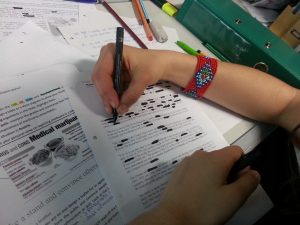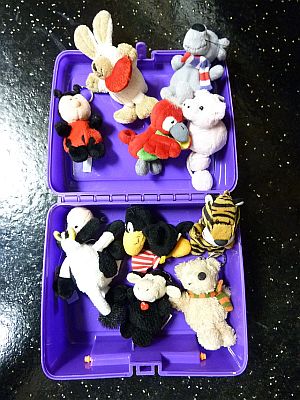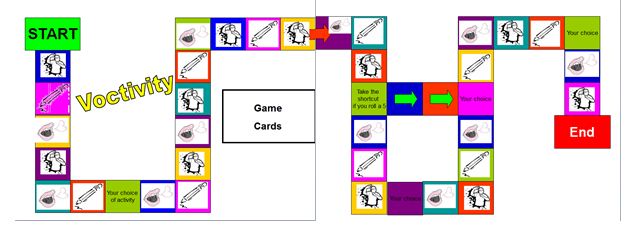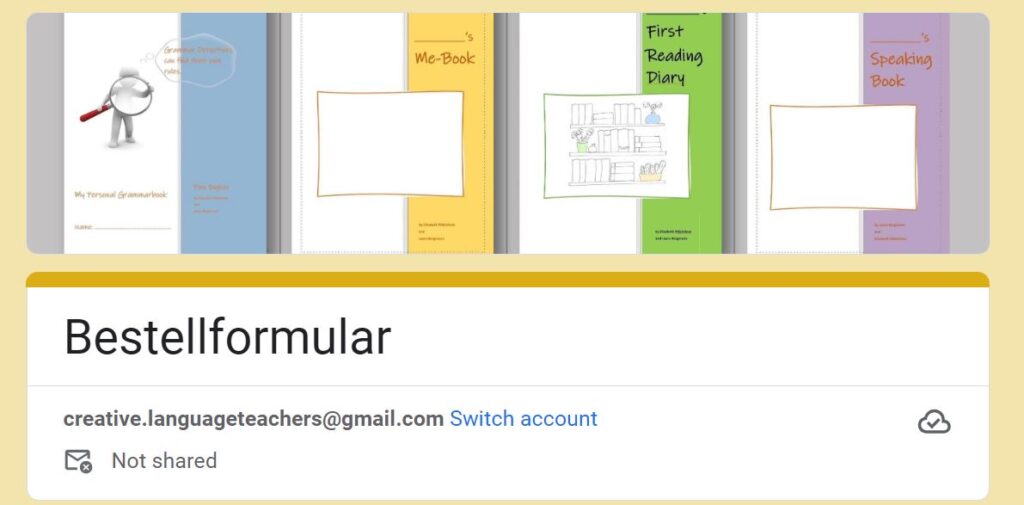Here you will find all kinds of games and activities to practice vocabulary in clas.
Colorful Pets
In this activity students practice the vocab of colors and use their top-down reading strategies to guess unknown words from a very “hands-on” context. Use any little toys or plush animals you have at home. Apart from learning new words the children learn new comprehension strategies. Download: Colorful Pets
Voctivity
A boardgame based on the idea of the well known game “Activity”. Students use their recent vocabulary cards and practice these phrases by speaking, miming and drawing. Click on the picture to download the full-sized board. Print the two halves on A4 sheets, laminate them. Download: Voctivity
Exercises that help remember new words:
Write yourself in
Give the students a list of about 10 new or recent words and ask them to construct true example sentences including their own names. (Can also be done in pairs.) e.g.: veal: we are both opposed to the production of white veal. tax inspector: I really hate tax inspectors.
Calligraphy
Students choose 10 – 15 difficult words from their vocab. box (or notebook) and rewrite the words, using calligraphic artifice to bring out the meanings.
Draw the word or draw a doodle
Students draw the word on the vocab. card or in their notebook.
Find the word a picture
Whole class activity, beginner to advanced Select about 50 – 60 recent words/phrases you want to revise and write them on separate cards. Give out the cards to the students (2 – 3 per student). Collect all kinds of pictures from magazines and stick them on filecards. (You can use these cards for other purposes as well) Spread the cards out on the desks and ask the students to mill around and find a card that somehow matches each of their words. It is up to them to decide how. Students then work in groups and explain to each other how they have matched their words and pictures.
Categorization
Give the students a list of words that need reviewing and ask them to categorize them. Choose one of the following possibilities:
- free categorization: the students find their own categories, don’t offer any help!!!
- positive words, negative words: students associate + or – with different words. There are no correct answers. Pairs or small groups compare their results.
- male or female words: even verbs and adjectives can be regarded as either male or female. Again, there are no correct answers. Students compare their judgements.
- Shapes: Students associate the words with different shapes.
- Other possible categories: past words, future words, high words, low words, me-connected words, separate-from-me words, words that sound nice, words that don’t sound nice, ……
The purpose of all these activities is to raise the students’ awareness and allow as many associations as possible to take place. A new word can only be recalled form memory if the learners have built enough associative links to the word.
Synonyms and Antonyms
Examples:
- Shaking/quivering I went to my window.
- A raccoon was clumsily/awkwardly dancing with our trash can.
- hot – cold
- sad – happy…
also consider “diagonal opposites”: Students find opposites for words that do not have clear opposites, such as ball, typewriter, Wednesday….. Students find their own personal opposites and discuss them in groups.
- balloon – stone (one is light, the other is heavy)
- Wednesday – Monday (one is a fun day where I have my riding lessons, the other one is a terrible day because we have our math test…)
Matching words: (Pairs or Dominoes)
Groups of 3-4, elementary to advanced You need: about 20 vocab. items on separate cards. For each item you need a second matching card containing either a synonym, the opposite, a dictionary definition or a groping definition Students work in groups. They deal out the cards. One student starts reading out a card, the others listen. The student with the matching card collects the pair and continues with a new card. The same game can be played as a game of dominoes.
Examples:
Games for describing people (Faces) Time Pairs Time Dominoes
Finding collocations
Pre-reading exercise: From a text that the class is going to read choose about 10 keywords and phrases. Ask the students to guess how they are used in the text. e.g.: Text on Earthquakes: You are going to read a text about the earthquake in the picture. Here are some words and phrases from the text. Can you guess how they are used in the text? the sea-bed the Richter scale tremors massive shocks having a bath Tokyo and Yokahama a huge wave The learners will probably find this rather difficult and be very curious to see how these words are actually used in the text. This curiosity and heightened attention to the new words will help the learners remember the correct usage.
Word Families -Word Sets
Students collect all the words of a semantic field (in groups, or whole class) e.g.: House, Jobs, Restaurant, Breakfast, Accident…. Also think of unusual word families such as:
- things found at home but not in the office,
- differences between Mr. X and Mrs Y…. ,
- differences between your bike and your friend’s bike….,
- different ways of talking (e.g. grumpily, softly, cheekily…)
- different ways of…..(walking, moving, listening, sitting, ….)
- things which : bend, creak, rot,…
- people who move slowly, jerkily, quietly….
Games
Where are we? The students work in groups of 4, one person thinks of a place, building, or room, and tells the others three things that would be found there. The others then guess the place. Example: shelf, sun-blinds, catalog (office) If the others can’t guess the word, additional objects may be offered!
Word profiles Ask the students to write 5 adjectives on slips of paper. Fold the papers and collect them in a box. Then get one student to pick out 3 slips at random, open them and write the adjectives on the board. The students work individually and produce a list of things described by the set of adjectives. Then groups compare their lists. example: old – grey- expensive : Rolls Royce
Call my Bluff Dictionary game (intermediate to advanced) Students work in groups of 3 or 4. Each group has a monolingual dictionary. Each group chooses a word from the dictionary which they think will be unknown to the rest of the class. Within each group one player then writes down a correct definition of the word, while the other players write down false definitions. Groups are paired (A + B, C+D,….) Group A tells group B the word they have chosen and each player reads out his definition. Group B must decide which definition is correct and which are bluffs.
Blackout

Hand out a page of text that is interesting and suitable for the learners. Allow students to read it and ask any vocab questions they might have. Make sure the learners understand the text.
Pairs then start blacking out parts of words and sentences with thick black markers. They read and re-read the text and keep blacking out more and more letters and words.
How far can they go — and still read the text?
Option: The pair that can black out most wins a prize.
Vocabulary.com
A really useful website and app for learning new words and phrases
After spending a whole day on testing all the available vocab and flash-card apps available in the Google app-store, I have finally found the ONE really useful tool that supports learning. While most vocab apps only match words and explanations (some use words and pictures) — this one really gives you a full picture of the meanings, contexts and usage of the words. It is only suitable for advanced learners (going towards B2 or higher) — but it is just perfect for anyone who really wants to know how words work. Check it out at vocabulary.com
Apart from being really cleverly designed, this app also allows teachers to create classes, share and assign lists that the students have to practice and even see their progress. AWESOME — and still free (at the moment).



